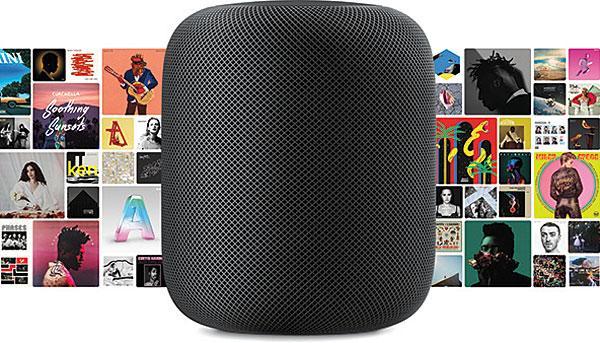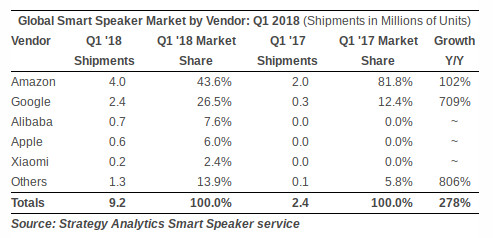Eye on Apple’s HomePod 4 Months After Launch

So how’s HomePod doing?
U.K.-based market intelligence firm Strategy Analytics estimates Apple shipped about 600,000 HomePods during the first quarter, which translates into a worldwide market share of about 6 percent of the 9.2 million smart speakers shipped during that period.
In terms of brand ranking, Apple is looking good having captured the No. 4 slot behind Amazon (No. 1 with 43.6 percent global market share), Google (No 2 with a 26.5 percent share), and China’s Alibaba (No. 3 with a 7.6 percent share).
As respectable as Apple’s out-of-the-gate numbers are, they represent only a tiny piece of the 9.2 million smart speakers shipped during the January through March period. But it’s worth noting that at $349, HomePod is far more expensive than its key compeitors. Amazon’s popular Echo sells for $100 and Google Home sells for $129.
To put things in perspective, Amazon shipped 4 million speakers in the first quarter while Google shipped 2.4 million. HomePod has a lot of catching up to do.
Speaking of catching up, Google is enjoying strong momentum as it slowly closes in on Amazon. The company experienced year-over-year growth of 709 percent compared with Amazon’s 102 percent. Looking back a year to the first quarter of 2017, Amazon commanded a staggering 81.8 percent market share compared with Google’s 12.4 percent share.

In a report last week, The Verge made the following observations:
…Strategy Analytics is careful to say “shipped” and not “sold” here. While the HomePod may primarily be sold through Apple’s website, where the distinction between those terms may not be as meaningful as it is for other brands, it’s still an important one to point out here in the event a sizable amount of HomePods are just sitting in inventory rooms…For more on the HomePod, see our comprehensive hands-on review here.Still, the HomePod’s slow start would seem to jibe with news that the product failed to meet Apple’s expectations. Bloomberg reported last month that Apple lowered its sales forecasts for the HomePod and slashed orders with supplier Inventec. Initially, the company saw its smart speaker [capturing] 10 percent of the market compared to Amazon’s 73 percent, mostly on the strength of an initial HomePod preorder wave, Bloomberg reported, based on data from Slice Intelligence. (Slice’s data appears to differ from Strategy Analytics’ when it comes to how much of the market each company owns.) But that enthusiasm faded after many of the early adopters got their hands on the product, and the HomePod captured only 4 percent of the market three weeks after launch, the report stated.
There are a few reasons why the HomePod may not be selling as well as Apple hoped. For one, the speaker is mostly treated as an iOS ecosystem accessory, like the AirPods, that works best only for those deep within Apple’s walled garden. For instance, the speaker and its Siri capabilities only play nice with Apple Music, and other music streaming services must rely on AirPlay to beam music from an iOS device to the speaker itself and cannot access voice control. On top of that, you need at least one iOS or Mac device to use the HomePod at all, leaving out PC and Android users who may not own an Apple-made device. Apple also launched the HomePod without stereo pairing support, which is coming later this year...
























































